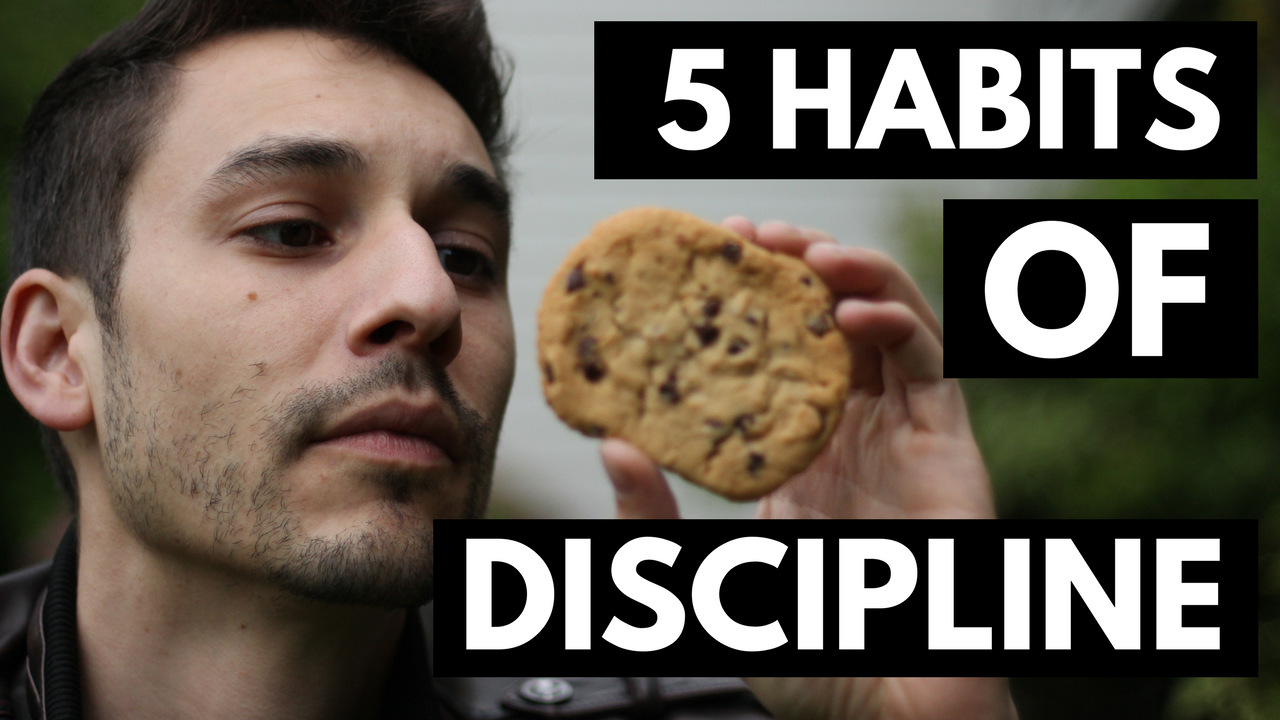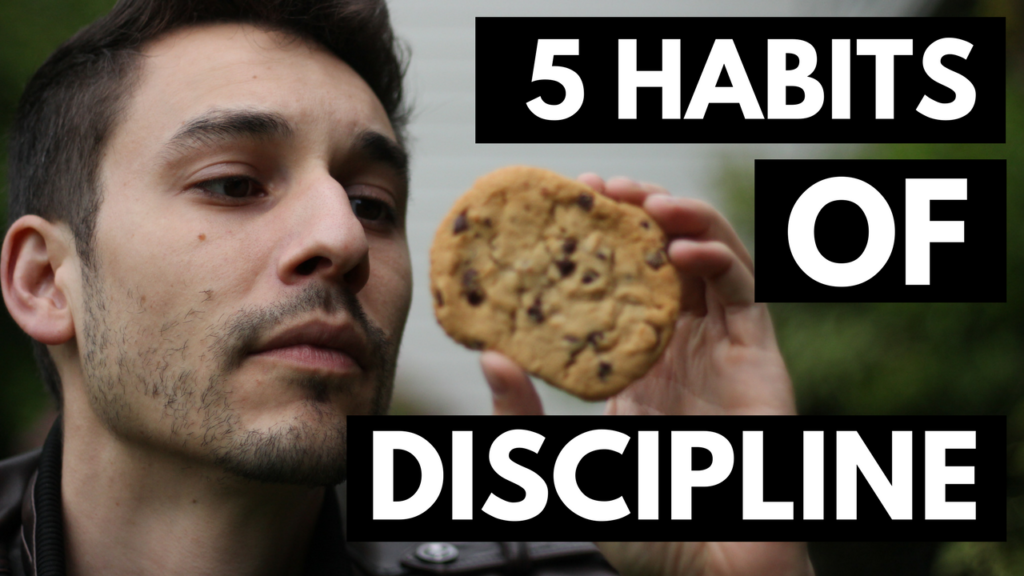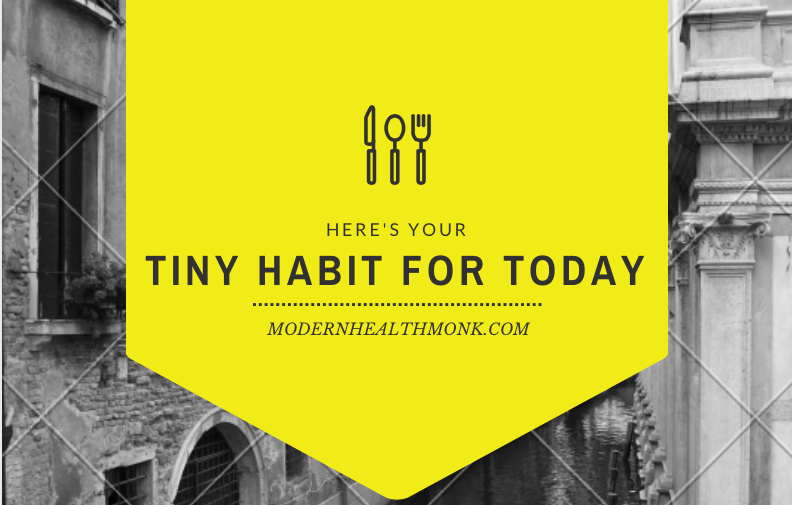
The 5 Habits of Highly Disciplined People (And Dieters)

How do the best in the world become, well, the best?
What are they doing that the average person is not doing?
Whether it comes to being fit or being in a healthy, long marriage, being more successful, or being happy, there is one trait all successful people typically embody. That is discipline.
In today’s article, I want to share with you five ways to be way more disciplined – about being the kind of person you want to be, so that you can reach your goals.
The Habits of Discipline
Habit #1: Doing What’s Right vs. Doing What’s Easy

The very first aspect of discipline is doing what’s right versus doing what’s easy. On a Saturday morning, like everyone else, I don’t really want to get up and shoot videos, or go to the gym (again), or go to a coffee shop for four or five hours to work.
Sometimes I do, but on the average day, I just want to do nothing!
But the essence of becoming the kind of person you want to be, through discipline, is doing the things that are right—those that are in alignment with your goals. Doing those things that are aligned with becoming the kind of person you want to be, rather than doing what’s easy in the moment.
You could even follow a checklist approach to your goals. Take a look at getting fit:
- Doing what’s easy: Eating whatever food is available, or whatever food tastes good
- Doing what’s right: Fighting off that craving for another half hour, and then eating the healthy food you’ve made at home
Here’s another example.
- Doing what’s easy: Eating fast-food because you just got off work and it’s 8 pm already
- Doing what’s right: Sitting down – or cooking – and eating food that’s in alignment with reaching your goals of health, energy, and looking awesome
Maybe doing what’s easy means not going to the gym. Maybe it means staying up late watching movies instead of going to bed early so you’re not cranky the next day and you have enough energy to go to the gym.
What does it mean when it comes to being in a better relationship?
Maybe it means that if you’re dating or married to your partner, you don’t raise your voice the next time they throw something on the floor and leave a mess in the living room.
Maybe it means you do the dishes, even though they said they were going to do them. You do them anyway, and you do it without being snarky, without making a comment, without churning up stuff the next day.
It’s not easy to do that. It’s easy for me to just complain and say,
“You said you’d do this. Where were you? You didn’t do what you said you would! This is not in balance. This isn’t 50/50.”
I’ve found that this has become a very powerful mantra in my own life. Especially when it comes to the weekend and all of us want to take it easy and just relax.
Sometimes, if you want to work on your goals and your dreams, you need to do what’s right, which may mean working every evening or working every weekend. If you want to lose a certain amount of weight, write a book, save for a vacation, or start a passion project – those habits require time and consistent effort, over time.
Sometimes you’ll make the right move when you ask yourself in the moment,
“What is doing what’s right? What is doing what’s easy?”
Habit #2: Choosing the Larger Reward
The second discipline habit is putting off short-term pleasure for long-term gain. A very famous book is based on this experiment called the marshmallow experiment.
In the 1960s to early 70s, a psychologist, and then Stanford professor, named Walter Mischel led a study where a child was offered a choice between one small reward and a larger reward. The small reward could be provided immediately, but the larger reward would only be given if the child could wait for a certain period of time.
The reward was sometimes a marshmallow, but it was often a cookie or a pretzel. In follow-up studies, the researchers found that the children who could wait longer for the preferred rewards tended to have better life outcomes as measured by SAT scores, educational attainment, body mass index, and even other life measures.
One of the aspects of discipline is being able to do what’s right for your future rather than what you want to do right now. Of course, that’s hard to do. When I’m tired, I want to sit down on the couch instead of shooting a video or writing a blog post at 7:00 at night. I want to go out to get food rather than cook food. I want to do something easy, rather than do something aligned with the life I want to materialize.
Some days, I don’t want to go to the gym, and there are times when I let myself off the hook. But the overall trend in a disciplined life is a matter of putting off the short-term pleasure for the long-term reward.
Sometimes it’s just a matter of asking myself, “Which trajectory am I on? Am I on the long-term pleasure or the short-term pleasure path?”
Those will definitely predict your trajectory down the line.
Habit #3: Act in Alignment With Your Goals – Regardless of How You Feel Right Now

The third discipline habit is to act in alignment with your long-term goals regardless of how you feel right now.
When I started to write articles online three or four years ago, I had to do it after a 10 hour a day job, and then work on my this project three hours a day, seven days a week. I did that for over three years until I made enough money to quit my job.
There was nothing fun about that. It wasn’t like I was so magically jacked up on my passion that it was a piece of cake to do this. I really didn’t want to do that. I was stressed out. I was grumpy every day for that multi-year period. It took a lot of work, and the easy choice would’ve been to just stop working altogether.
I didn’t want to get up Saturday morning after just doing a 60, 70, hour work week. That was the last thing I wanted to do in the world. But I had to remind myself that before I had my business, I had no reason to wake up on Saturday morning early or even to leave the house before one in the afternoon.
For me, having this long-term goal that was a huge source of purpose and meaning in my life gave me tons of energy. It was based around the last vacation I took with my girlfriend, when we were in Cartagena, Colombia.
As we walked around the painted alleyways of Cartagena, we found a cute little European cafe, where we sat down to have some breakfast. There were only two other people in the entire room, and it was a quiet, weekday morning. While I was sitting there drinking coffee with her, I realized that all of my friends were back home sitting in an office, sitting at a desk wishing they could be anywhere else. And here I was in paradise enjoying myself.
That specific memory, which I called the “Cartagena Vision” (the Cartagena, Colombia trip we had) became that taste of freedom. Then I started thinking, “You know what? I want to be self-employed and make enough money to live so that we can do that more often.”
It wasn’t until I had that powerful reason to reach my goal that I had a reason to wake up Saturday and Sunday every day. Since then, I haven’t taken that many days off in the four years since because I don’t want to. It’s not because I can’t at this point.
It’s because I don’t want to, because I want to keep building that vision. For me, the essence of putting off the short-term pleasure is having such a compelling future vision, that you look forward to so much, that you want to work every day towards that vision and towards that goal.
Habit #4: Taking 100% Responsibility For All Your Results (or Lack of Results)

I started getting results when I stopped complaining, and took responsibility.
The fourth habit here is to be meticulous about taking 100% responsibility for your life. When I graduated college, I complained so much that I got paid so little, despite going to Clemson University, having a Biology and Environmental Science degree—that I was more qualified, smarter, more personable.
And despite those things, I never got a “good” job.
I complained about how unfair it was.
I complained and moaned because I didn’t take responsibility for my life. It was easier for me to complain about the economy, God, or bad luck messing up my life, rather than doing what was right and upgrading my own skillset, mindset, and hustle to build the kind of life that I wanted.
It was easier to just complain than to do what was right (the work!).
What I find is that if I view myself as 100% responsible for creating the vision of my future, and everything that’s good or bad that happens is my fault, then I will actually do the right thing. If I’m arguing with my girlfriend and there’s some tension cropping up, I just assume it was my fault.
I assume it was my fault, because then as a result, I can find ways to improve myself even if it wasn’t my fault.
If something happens in my business, if I get negative feedback about my book or if something’s going on with my health, I assume it was my fault, because then it leads to the ability to improve myself. If I blame God, genetics, my parents, well it’s going to be easy, isn’t it?
Isn’t that convenient? You don’t have to do anything. You don’t have to do anything. It was just their fault. It was somebody else’s fault. As a result, what are you going to do to improve? There’s nothing there to learn from.
Most successful people—the most disciplined ones—take the most personal responsibility in their lives. It’s very difficult to improve yourself and change the kind of things that you want to change if you’re blaming the world for all your problems.
I see so much of it on social media where people are crying about the way things are, thinking that the reason that they don’t have a job or the reason their family’s struggling is because of the president, or the air, or the economy.
Of course those things matter, but ultimately, if you are your own nucleus of your life, you’re creating the things that are happening.
You can blame all day long. You can cry. You can moan, but at the end of the day, life will be the same. The world works by taking responsibility for what’s not working, and then improving it. Figure out how you as a person can upgrade yourself.
Habit #5: Religiously Manage Your Time

The fifth habit of the most disciplined people is religious time management. Cal Newport, in one of his books, How to Become a Straight A Student, talks about how many of the straight A students he interviewed said that they had plenty of time.
He was confused, because he always assumed that the straight A students had crazy work ethics and insanely long work weeks. What he found is that they were religious about specifically blocking their study time, about their study techniques, and about not wasting time.
What I find is that disciplined people are really meticulous and religious about the way they structure their time. That’s why I encourage you to actually schedule your habits.
If they’re scheduled, you’re guaranteed to do them, because you see them on your calendar. You’re not going to get home at 7:00 wondering, “What do I do?”
I have every part of my schedule mapped out. Every hour of my day, because I know that I will do my meditation, go to the gym, and cook my food if it’s on the calendar. I will do all the stuff in alignment with my future goals and what I’m trying to achieve.
Without that kind of religious discipline about controlling your time, it’s very difficult when you get home with a massive block of time and you’re not quite sure what you should do. Even if you’re the most disciplined person, if there’s no focus, how are you going to reach that endpoint you’re trying to get to?
The religious planning and scheduling of every minute of every day, of living a truly conscious, deliberate life, is what I find to be common among the most disciplined people I know. You can apply that to your fitness, what you eat, writing a book, having a better relationship, or just being a happy person.
The Bottom Line Discipline Commandments

At the end of the day, what I tend to see the most in disciplined people is two things:
One, they have clarity on what their daily rituals are, the rituals that will help them materialize the goals they want.
Two, they are religious about making sure those gets done every day, regardless of what day it is, regardless of how they feel, regardless of whether they want to right now.
They make sure it gets done.
What’s one aspect of your life you could be way more disciplined in?
-Alex

The sacred rule is true — if you dont have sugar in house you cant eat sugar.
I will never buy these crap foods to put in my have. ONLY real food.
It’s really an enlightening piece of motivation. True essence of how to move towards your goal. Thanks a lot !
I think I could more disciplined in my interactions with individuals. Take time to listen and lean in.
I need to work on this too Philip.
Thanks Mate!
Im really benefitting from you.
And i really see that the things that look so hard to us are just simple Things that we lack to do..
And if we seek change
I see that there have been 2 essential steps for me
1 )
we must first be passionate about gainining the knowledge to the path of change
2) we must be Continuously committed to follow that path With a mindset of Disipline,Betterness Each day And gratitute for the things we’r trying to do..
Lemme finish with a quote of mine
”
By Knowledge and action we Rise.. 🙂
”
Thank you For All your effort Alex! Looking forward to seeing great things from you 💜